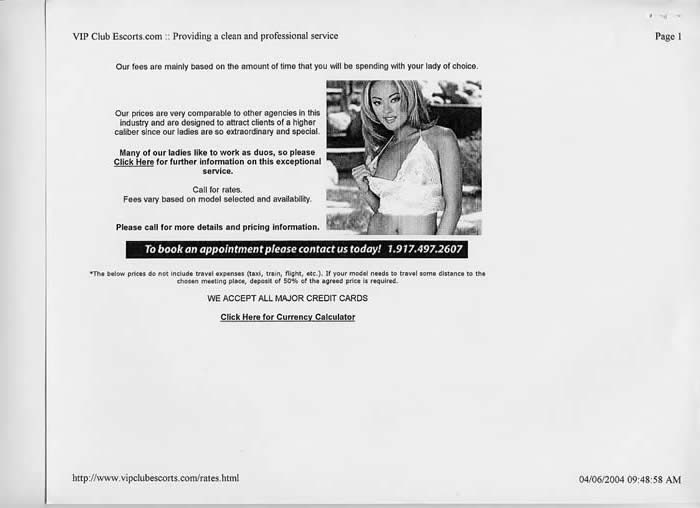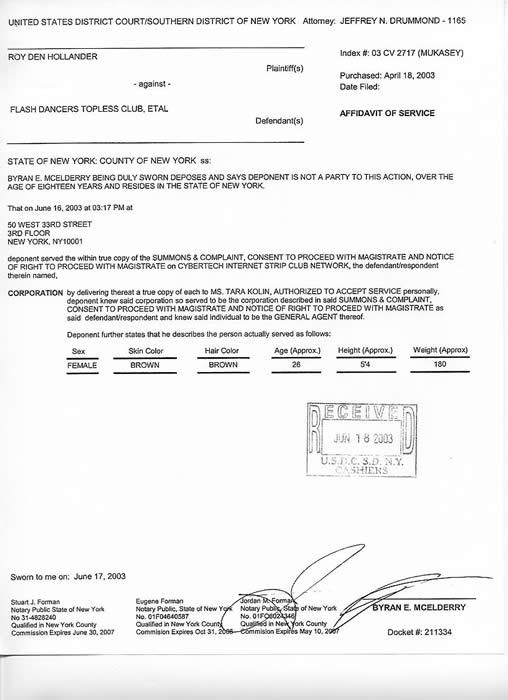
UNITED STATES DISTRICT COURT
SOUTHERN DISTRICT OF NEW YORK
---------------------------------------------------------x
Roy Den Hollander
Plaintiff, Docket No. 03 CV 2717 (MBM)
-against-
Flash Dancers Topless Club, et al.,
Defendants.
---------------------------------------------------------X
Addendum to Plaintiff’s Memorandum of Law In Opposition to Certain Defendants’
Motions to Dismiss for the purpose of Addressing Additional Issues Belatedly Raised by
Defendant Cybertech Internet Solutions
6. (Number continuation from main memorandum) Plaintiff’s addendum memorandum in opposition to Enterprise movant Cybertech Internet Solutions’ letter to the Court in which Cybertech joined the Kuba, Mundy & Associates motion to dismiss but also raised additional issues specific to Cybertech.
Preliminary Statement
On March 29, 2004, defendant Cybertech Internet Solutions (“Cybertech”), through its attorney David L. Feinberg, finally responded to the complaint by requesting dismissal of this RICO action in a letter to the Court. The letter came more than eight months after Cybertech was served on June 16, 2003, Exhibit A, and three months after being prodded into action by the plaintiff’s application for default in December 2003.
Cybertech was initially listed in the complaint as “Cybertech Internet Strip Club Network,” which Mr. Feinberg gratuitously commented in his letter was an “absurdity,” apparently meaning the name Cybertech Internet Strip Club Network did not accurately identify his client. Feinberg Letter, March 29, 2004, ¶ 1, Exhibit B. But Cybertech Internet Strip Club Network is the name under which Cybertech operates web sites for selling prostitutes and providing pornography. For example, Enterprise movant Cybertech runs the FlashDancers web site at www.flashdancers.com. At the bottom of FlashDancers introduction window it states, “Web design and hosting by Cybertech Internet Solutions.” Exhibit C, p. 2. Entering the FlashDancers site as a member reveals the options offered by Enterprise movant Cybertech. Exhibit D. Included in the sorted services is “Cybertech Internet Strip Club Escorts” through which prostitutes can be hired for what are euphemistically called “consultations.” Exhibit E. Enterprise movant Cybertech even recruits prostitutes through the Cybertech Internet Strip Club Network. Exhibit F. For customers to choose a girl, Enterprise movant Cybertech uses its VIP Escort web site that provides pictures of the ladies—some with their faces blurred out, Exhibit G, and prices “very comparable to other agencies in this industry … designed to attract clients of a higher caliber….” Exhibit H.
By Mr. Feinberg’s letter to the Court, Enterprise movant Cybertech joined the motion to dismiss submitted on September 19, 2003 by Kuba, Mundy & Associates, Nicholas J. Mundy and Peter Petrovich. Mr. Feinberg’s letter came three months after the plaintiff had already served his answering memorandum of law on December 19, 2003. Mr. Feinberg’s delayed response and his raising of additional issues “[w]ith respect to specific allegations made against” Cybertech made this addendum memorandum necessary. Feinberg Letter Exhibit B, ¶ 3.
Argument
In addition to Section 1 of the plaintiff’s memorandum of law filed December 19, 2003, this argument addresses matters peculiar to Mr. Feinberg’s March 29, 2004 letter to this Court, Exhibit B.
Mr. Feinberg makes an inaccurate statement in paragraph two of his letter where he says the complaint “has made no allegations against Defendant Cybertech that fall outside of RICO….” RICO violations require the commission of predicate acts that are specified in 18 USC 1961. The complaint cites the predicate acts allegedly engaged in by all the defendants in ¶s 466 to 683. But the complaint also alleges other criminal acts that are not predicate acts in ¶s 684 to 853 and, therefore, in Mr. Feinberg’s words, “fall outside of RICO.” The complaint in ¶s 684-690 makes allegations of non-predicate criminal acts by Enterprise movant Cybertech that include promoting prostitution, see Exhibits E, F, G, and H, making material misstatements to obtain visas for alien prostitutes, employing prostitutes not lawfully admitted to work in the U.S., violating Federal and State tax laws and conspiring to violate Federal and State laws. Perhaps Mr. Feinberg confused allegations of non-predicate acts with pendent state law causes of action in the complaint at ¶s 894-899. There are no pendant state law claims against Enterprise movant Cybertech at the present.
The predicate acts alleged against Enterprise movant Cybertech include:
In the third paragraph of Mr. Feinberg’s letter he wrongly says, “I would like to stress to this Court that Cybertech has no employment relationship with any of the other Defendants….” If that were true, then why is Cybertech listed as the host of FlashDancers web site. Exhibit C. Sounds like an “employment relationship” to me. Even so, such a rebuttal of Mr. Feinberg’s statement of purported fact really belongs at trial or following discovery in a summary judgment motion—not in a motion to dismiss. It is not the Court’s function at this stage of the proceedings to weight the evidence that might be presented at trial; instead, the Court should merely determine whether the complaint is legally sufficient. Geisler v. Petrocelli, 616 F.2d 636, 639 (2d Cir. 1980). And legally sufficient means, “[a] complaint should not be dismissed for failure to state a claim ‘unless it appears beyond doubt that the plaintiff can prove no set of facts in support of his claim which would entitle him to relief.’” Berk v. Tradewell, 2003 Lexis 12078, *15, 16 (SDNY July 16, 2003, J. Mukasey)(citing Conley v. Gibson, 355 U.S. 41, 45-46, 2 L.Ed.2d 80, 78 S.Ct. 99 (1957).
Mr. Feinberg goes on in paragraph three making other purportedly factual statements that he asks the Court to take as evidence just because he is making the assertions. That is a unique basis for deciding a motion to dismiss: if the defendant’s attorney says in a letter that his client did not do the acts alleged, then the complaint should be dismissed. Such a rule would have the benefit of quickly clearing a court’s docket, but the impact on justice would be pretty dismal.
Although he does not say such, Mr. Feinberg may also be requesting summary judgment based on his assertions in paragraph three. This would call for the application of a standard that when a defendant’s attorney says his client did not do what is alleged, that is enough to show there are no genuine issues of material facts and the defendant should prevail on the law. Exhibits C, D, E, F, G and H alone create the basis for a reasonable inference that Enterprise movant Cybertech peddles pornography and prostitutes and is associated with Enterprise movant FlashDancers in providing such. I doubt the word of an attorney would be good enough to rebut that evidence in the minds of jurors. But even if it would, discovery still has not occurred, and it is that procedure along with subsequent summary judgment motions that define disputed facts and issues and dispose of unmeritorious claims, Sweirkiewicz v. Sorema NA, 534 U.S. 506, 512, 152 L.Ed.2d 1, 122 S.Ct. 992 (2002).
For the above reasons and those contained in the plaintiff’s December 19, 2003 memorandum of law, the plaintiff requests that the Court deny Cybertech’s request for dismissal.
Dated: New York, NY
April 30, 2004
_____________________
Roy Den Hollander, Esq.
Plaintiff pro se
545 East 14th Street
New York, NY 10009
(212) 995 5201
Exhibit A

Exhibit C
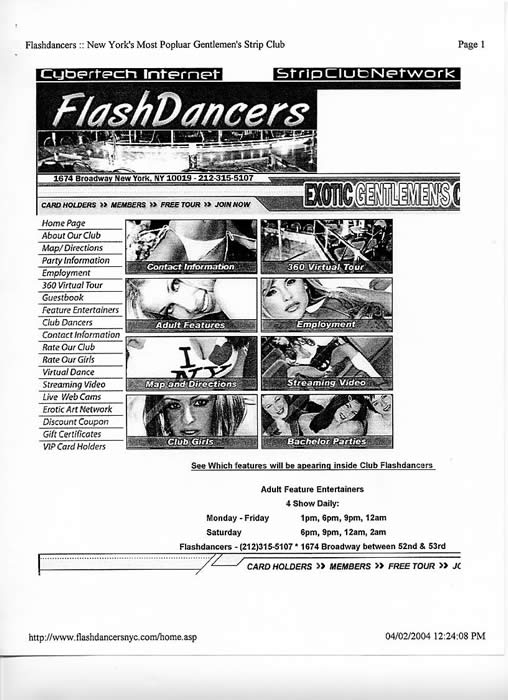

Exhibit D
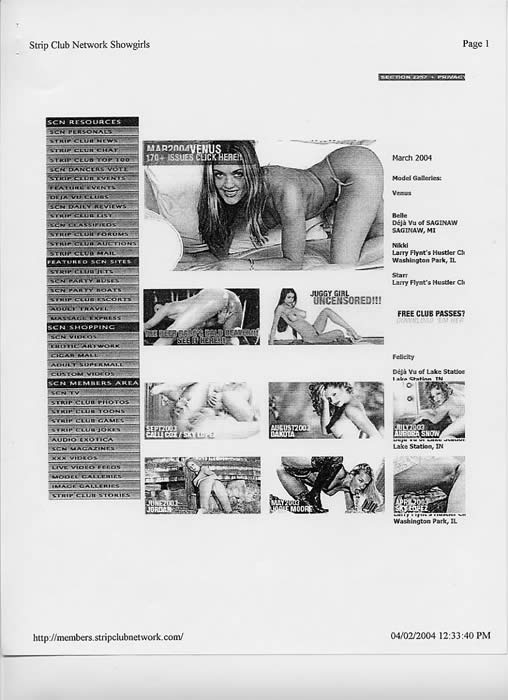
Exhibit E
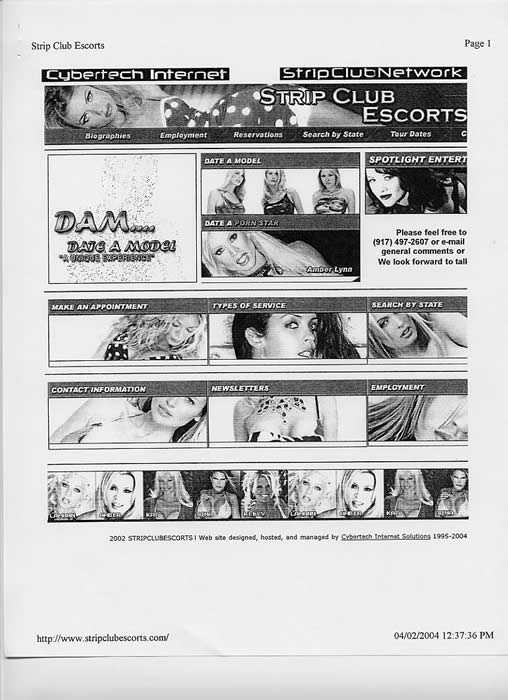
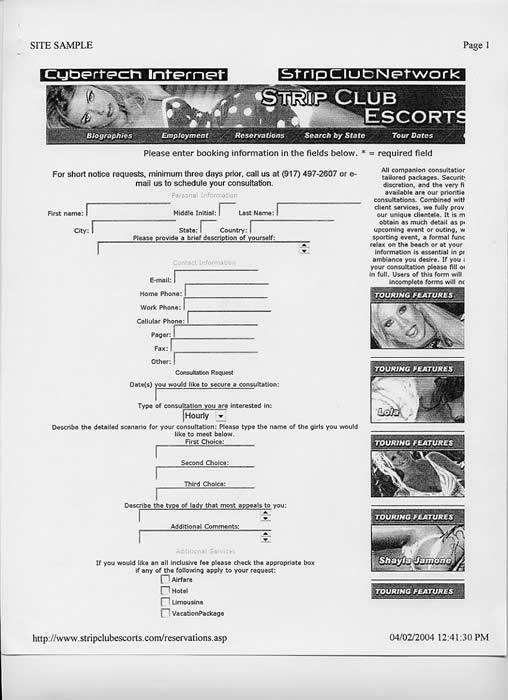
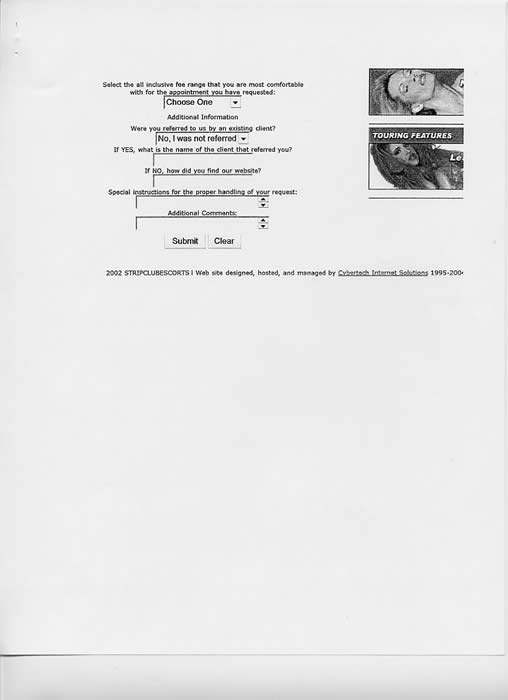
Exhibit F
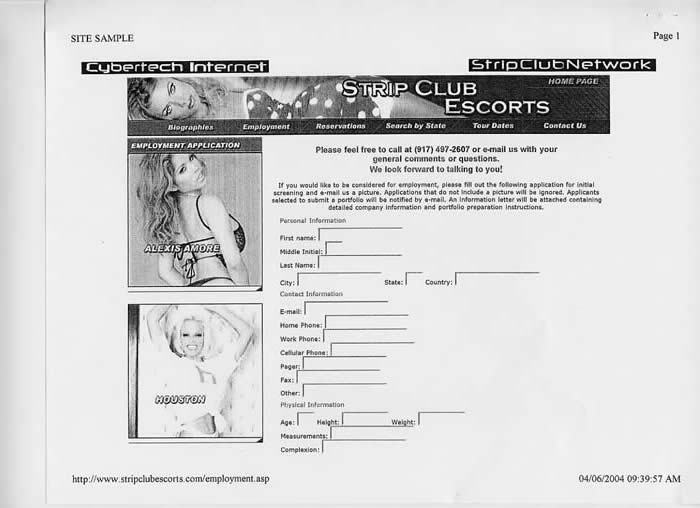
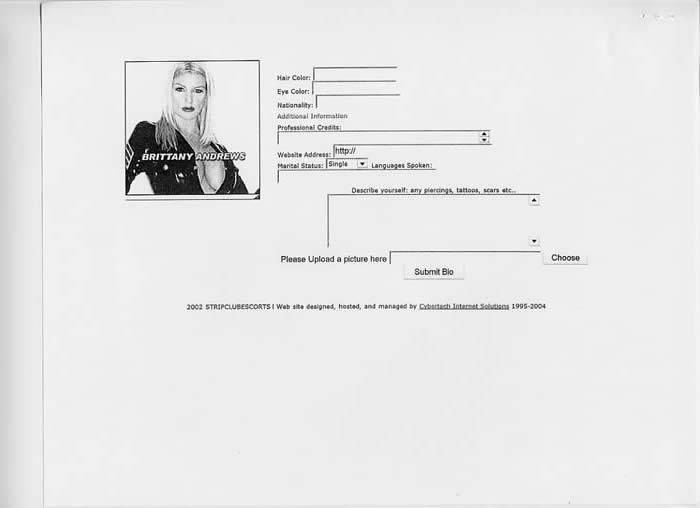
Exhibit G
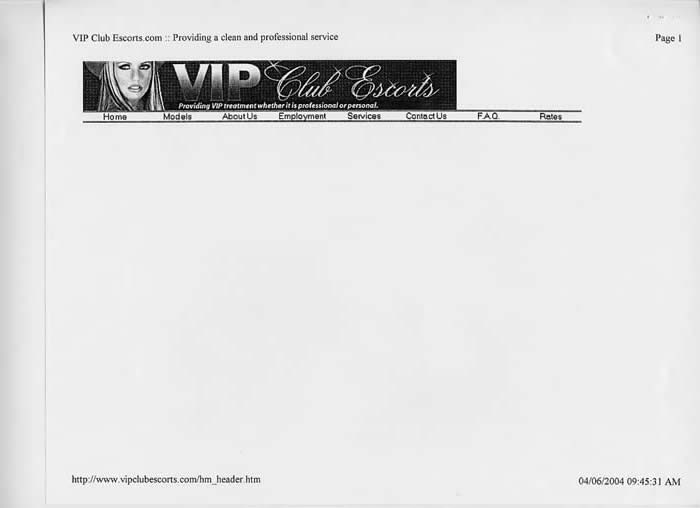
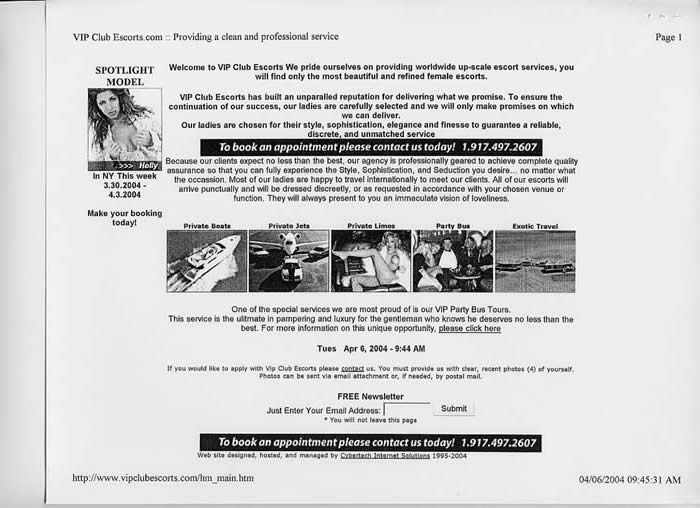
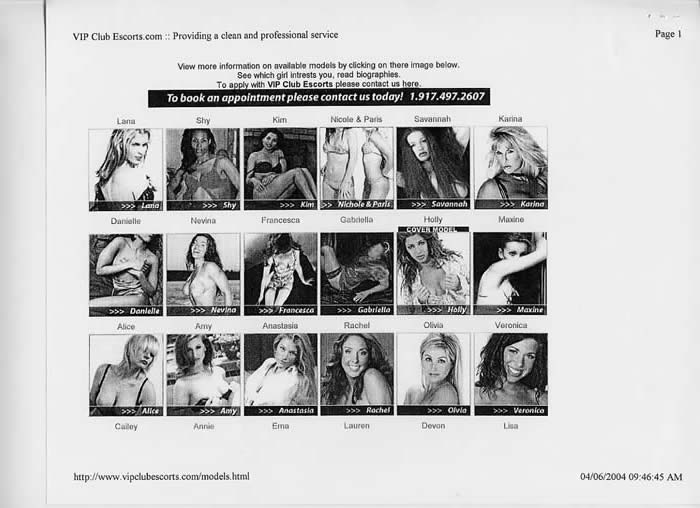

Exhibit Ho
